https://youtu.be/_v7DJzhY-WM
https://youtu.be/doU94yxiYdk
https://youtu.be/doU94yxiYdk
 |
| Schoolchildren wave the national flags of the Philippines and China along the route of Chinese President Xi Jinping's convoy at the Malacanang palace grounds in Manila on Tuesday. Photo: AFP |
China-Philippines relations have been one of the most vacillating connections among China and its neighboring countries. During the rule of Benigno Aquino III, bilateral relations were at a low ebb due to frictions over the South China Sea. Incumbent President Rodrigo Duterte changed the Philippines' diplomatic course and brought ties with China back to the right track.
Last year, China surpassed Japan and became the largest trading partner of the Philippines. The two are conducting negotiations over the possible joint exploration of oil and gas in the disputed waters. If they reach an agreement, it could serve as an exemplary model for South China Sea claimant countries.
However, not everybody is happy to see Beijing and Manila set aside disputes and develop friendly ties. Besides obstruction from pro-US factions within the Philippines, some US and Western forces do not want to see rapprochement between China and the Philippines and even pressure the Duterte government to cut relations.
Recently, some Western media claimed that most of the assistance and investment that China promised to the Philippines was never fulfilled. Such tone maliciously aims to drive a wedge between Beijing and Manila.
In recent years, China has been advancing its Belt and Road initiative in Southeast Asia and has no reason to skip the Philippines when seeking investment and cooperation. In fact, relevant departments of the two countries have been working to push forward the implementation of cooperation projects.
The West has been accusing China's Belt and Road initiative of locking some countries into a debt trap. However, when it comes to the Philippines, the West criticized China for not fulfilling its promises. Behind such hypocritical words lie the West's deep-seated prejudice and hostility against China.
When the US strategically targets China, it is difficult for the Philippines - geographically adjacent to China while closely watched by the US - to keep independent strategic thinking and remain firm-minded.
But independent thinking and strong political determination are essential for every country. When Duterte first thought about mending ties with Beijing, independent thinking prompted Manila to face the question: What advantages can the country gain from enmity with China, if any? Will the Philippines benefit from it or will it be exploited by external forces?
The whole region should keep alert to whom will benefit from confrontation among South China Sea stakeholders. As one of the US' allies in Southeast Asia, the Philippines will always be a tool of the West to instigate provocations in the waters. After twists and turns, Philippine society will form its own judgment.
Many Philippine elite might have thought that their country and the entirety of Southeast Asia could rely only on the US and the West before China's rise, yet most regional countries did not achieve modernization. China offers more options for the Philippines, and because of China's rise, the Philippines and Southeast Asia have gained more attention. Compared with the Aquino era, the Philippines under Duterte has acquired more strategic initiatives without becoming overly dependent on other countries.
China-Philippines friendly cooperation has changed the strategic position of the Philippines and brought about a new pattern for its development. It is expected that Xi's visit will accelerate bilateral cooperation.
Newspaper headline: Xi, Duterte upgrade ties, Xi’s Philippine visit a ‘milestone’ event, Improved relations help keep stability in S.China Sea: expert
https://youtu.be/Nu0q5wraLGQ
As cooperation and political trust improve, China and the Philippines agreed on Tuesday to lift ties to a comprehensive strategic cooperation relations while stressing the need to manage disputes in the South China Sea through "friendly negotiations."
The decision was announced after visiting Chinese President Xi Jinping's meeting with Philippine President Rodrigo Duterte on Tuesday in Manila, the Xinhua News Agency reported.
Chinese experts stressed that the visit is a milestone event in the development of bilateral relations and the two countries will pursue greater cooperation under the framework of the China-proposed Belt and Road initiative (BRI) in the coming years.
As friendly neighbors across the sea, China and the Philippines enjoy geographic proximity and a strong bond that links the two peoples and cultures, Xi said, Xinhua reported on Tuesday.
Since Duterte took office, China and the Philippines have reopened the door of friendship and cooperation to each other, bringing real benefits to the two peoples and making important contributions to regional peace, stability and prosperity, Xi noted.
Xi's visit will largely promote bilateral relations as the visit shows that China values friendly relations with the Philippines, Gu Xiaosong, a research fellow on Southeast Asian studies at the Guangxi Academy of Social Sciences, told the Global Times on Tuesday.
"It is a milestone event in the development of bilateral relations," Gu remarked.
Glenn Penaranda, commercial counselor of the Philippine Embassy in China, told the Global Times on Tuesday that "Xi's visit is vital in highlighting the significant relationship between our two countries, particularly in trade and investments. The visit will encourage more and deeper engagements."
Improved China-Philippines relations will also play an important role in maintaining the stability of the South China Sea, experts noted.
"If China and the Philippines can reach an agreement on the exploration and development of oil and gas resources in the South China Sea, it will be a breakthrough in economic cooperation in the region and will largely promote the safety of the Asia-Pacific," Gu said.
Growth prospects
The prospects for economic and trade relations between the two countries are very bright as Philippine priorities are aligned with the key directions for industrial capacity cooperation under BRI, in sectors such as infrastructure, construction and building materials, chemicals and manufacturing, Penaranda said.
Gu agrees, saying that bilateral economic and trade ties will be further enhanced to a higher level, and the two countries will pursue more cooperation under the BRI.
As a developing country with more than 100 million people, the Philippines needs to improve its infrastructure and enhance the growth of its industrial enterprises, Gu noted.
"We need to better understand the opportunities for bilateral cooperation through increased engagements by enterprises," Penaranda said, noting that it is important that the frequent reciprocal visits of officials and business delegations continue.
Experts said China is committed to advancing the development with other countries and the Belt and Road initiative will bring greater growth to other developing countries and promote the economic integration of the Asia-Pacific region.
The two countries have conducted broad cooperation in transportation infrastructure and industrial parks and energy, and China is the Philippines' largest trading partner.
Trade between China and the Philippines increased 8.5 percent year-on-year to $51.28 billion, according to information released by China's Ministry of Commerce (MOFCOM) on Thursday.
As of the end of September, China's investment in the Philippines was $1.25 billion and the Philippines' investment in the Chinese market reached $3.33 billion, according to the MOFCOM.
Experts said cultural and educational exchanges between the two countries also see a huge potential.
The hospitality toward Chinese people is easily felt among the Philippine public.
The Chinese and Philippine flags were placed along Roxas Boulevard in Manila a week ago. Many Chinese who live and study in Manila waited along the boulevard on Tuesday to welcome Xi.
"We're so excited that President Xi has come to Manila. We hope the two countries could strengthen cultural exchanges in the future," Kui Jiangong, a PhD candidate from China who studies at Adamson University in Manila, told the Global Times on Tuesday.
"I have met many locals who like to discuss Chinese culture with me as they want to know more about China," he said. - Global Times
Related posts:
Point man: Asean has designated Manila its
‘leader’ in dealings with China, but can the moody Duterte, here shown
bonding with Xi on a...
Illustration: Liu Rui/GT ‘America First’
undermines multilateralism According to media reports, the
Asia-Pacific Economic Cooperatio...
Related:
China rescues Brunei
https://youtu.be/SmaeUoCh0A8






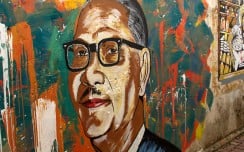
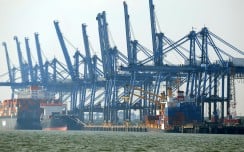
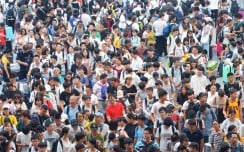
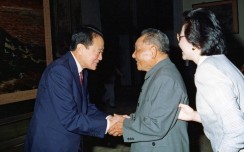



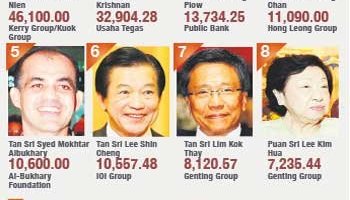
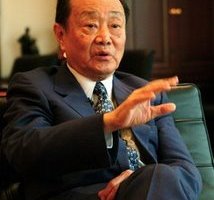





 Going global: The short but colourful opening ceremony of CIFIT by Wang Yang on Sept 8 at China’s beautiful coastal town of Xiamen.
Going global: The short but colourful opening ceremony of CIFIT by Wang Yang on Sept 8 at China’s beautiful coastal town of Xiamen. Brisk business: A popular “food cultural village” that sells typical Xiamen food near Xiamen University.
Brisk business: A popular “food cultural village” that sells typical Xiamen food near Xiamen University.